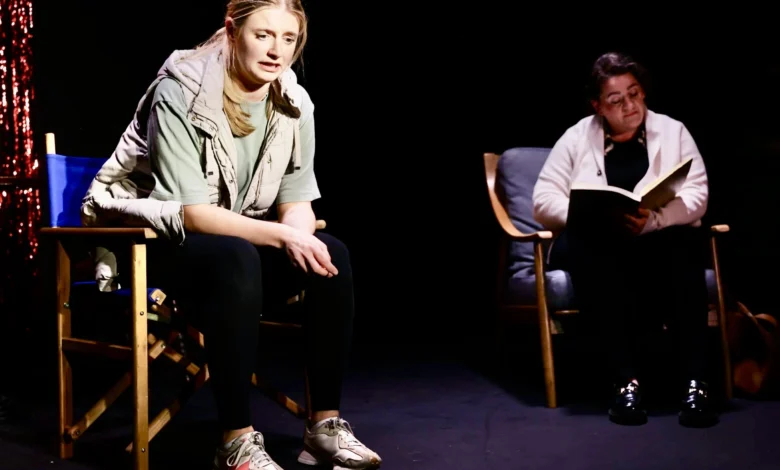
Review: Stayin’ Alive at Liverpool’s Royal Court Theatre
A Powerful, Darkly Comic Dive into Grief and Self-Discovery.
Written and presented by Victoria Oxley with support from Emma Bispham ‘Stayin Alive’ ran for two nights at Liverpool’s Royal Court Theatre (24 & 25 September). If there’s one thing you can’t accuse Stayin’ Alive of, it’s pulling its punches. Victoria Oxley’s debut play, a dark comedy imbued with raw honesty, doesn’t shy away from the kind of emotional complexity that most theatre scripts tend to gloss over. The play delivers a whirlwind of emotions, addressing grief, sisterhood, survival, and the occasional dodgy tribute act. In a world where grief often feels too messy for a neatly tied-up ending, Oxley’s writing reminds us that sometimes, surviving means facing the mess head-on and laughing through the tears.
With a minimalist set the play opens with the kind of claustrophobic energy that sets the tone for the rest of the show. Maggie is stuck. Stuck in a house that no longer feels like a home, stuck in a grief that refuses to let her move on, and stuck in a therapy process that’s doing very little to help. Her therapist, it seems, is more of a punching bag than a guide, and the only one who seems to have her number is her sister, who, in a particularly memorable moment, threatens to knock Maggie out if she doesn’t snap out of it.
But Maggie? Maggie is staying put. As the walls close in on her — quite literally in the production design — Maggie’s emotional unravelling takes centre stage, framed by a series of memories, rituals, and songs that she can’t quite bring herself to sing. Her voice, in both the literal and figurative sense, is lost somewhere between the Blue Anchor pub and Elkie Brooks. But as the night unfolds, something happens: Maggie begins to piece herself back together, one memory at a time, with a little bit of humour and a whole lot of brutal honesty.
The dialogue, crafted by Oxley herself, is sharp, biting, and often hilarious, despite the weight of the themes it tackles. Maggie’s journey through grief isn’t a linear path; it’s more of a spiral, a frantic dance between remembering and forgetting, between the need to hold on and the urge to let go. It’s this complicated terrain that Oxley navigates with a wit so razor-edged that you’ll find yourself laughing even as your heart breaks for Maggie. The moments of levity, however, never undercut the seriousness of the subject matter. Instead, they give the audience space to breathe amidst the tension, reminding us that survival sometimes involves finding humour in the darkest places.
At the heart of the production is the relationship between Maggie and her sister — two women bound by blood, trauma, and a shared history that neither is quite ready to face. The dynamic is captured perfectly by the stellar performances of Oxley and Emma Bispham, whose chemistry on stage crackles with both tension and tenderness. Their interactions feel real, messy, and raw — the kind of sibling rivalry that can sometimes morph into something more complicated, something more poignant. Bispham’s portrayal of the no-nonsense sister, who clearly loves Maggie but has run out of patience with her, provides a perfect foil to Oxley’s more fragile, scattered performance as Maggie. Together, they create a push-and-pull that is at once funny and heartbreaking.
Director Megan Marie Griffith expertly crafts the pacing of the show, ensuring that the tone shifts between moments of intense emotional release and sharp, quick-witted exchanges. The production’s staging — minimalist but effective — reinforces the feeling of Maggie being trapped in her own mind, a prisoner to both her memories and her grief. The sparse, yet striking, design choices help to create an atmosphere that mirrors the suffocating nature of Maggie’s emotional state, while also providing space for the explosive bursts of humour that punctuate the performance.
The play’s soundtrack is integral to the storytelling, particularly the recurring motif of music that Maggie can never bring herself to sing. Whether it’s Elkie Brooks or some other forgotten anthem, the music becomes a symbol of Maggie’s emotional journey. The moments when the music swells, and when Maggie finally allows herself to feel, are some of the most moving in the production.
Victoria Oxley’s writing debut is undeniably a triumph. Stayin’ Alive is a play that doesn’t offer easy answers or tidy resolutions, but it offers something far more valuable: the raw, unflinching truth about what it means to be human. Grief isn’t something you simply move through — it’s something you live with, and, as Maggie’s journey teaches us, sometimes the only way to survive it is to keep going, even when you don’t have a clue where you’re headed.
In a world that often expects us to move on quickly, Stayin’ Alive is a timely reminder that healing takes time, it takes struggle, and it takes a little bit of humour along the way.
If you’re looking for a show that will challenge your emotions, make you laugh, and leave you with a feeling of having witnessed something truly special, Stayin’ Alive is not to be missed. Victoria Oxley’s voice is impossible to ignore, and this play — in all its dark, funny, and beautifully complicated glory — ensures that you won’t forget her anytime soon.







